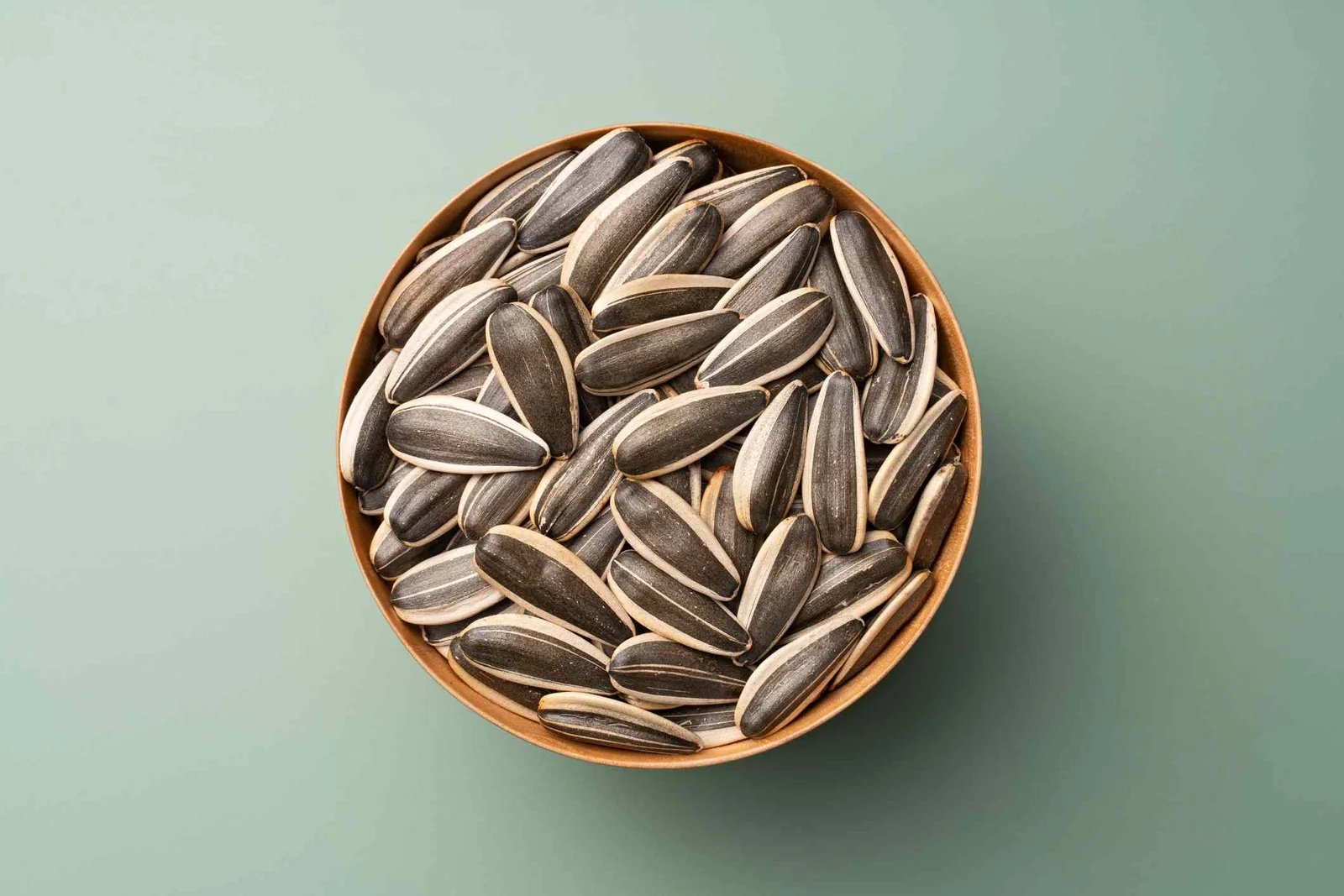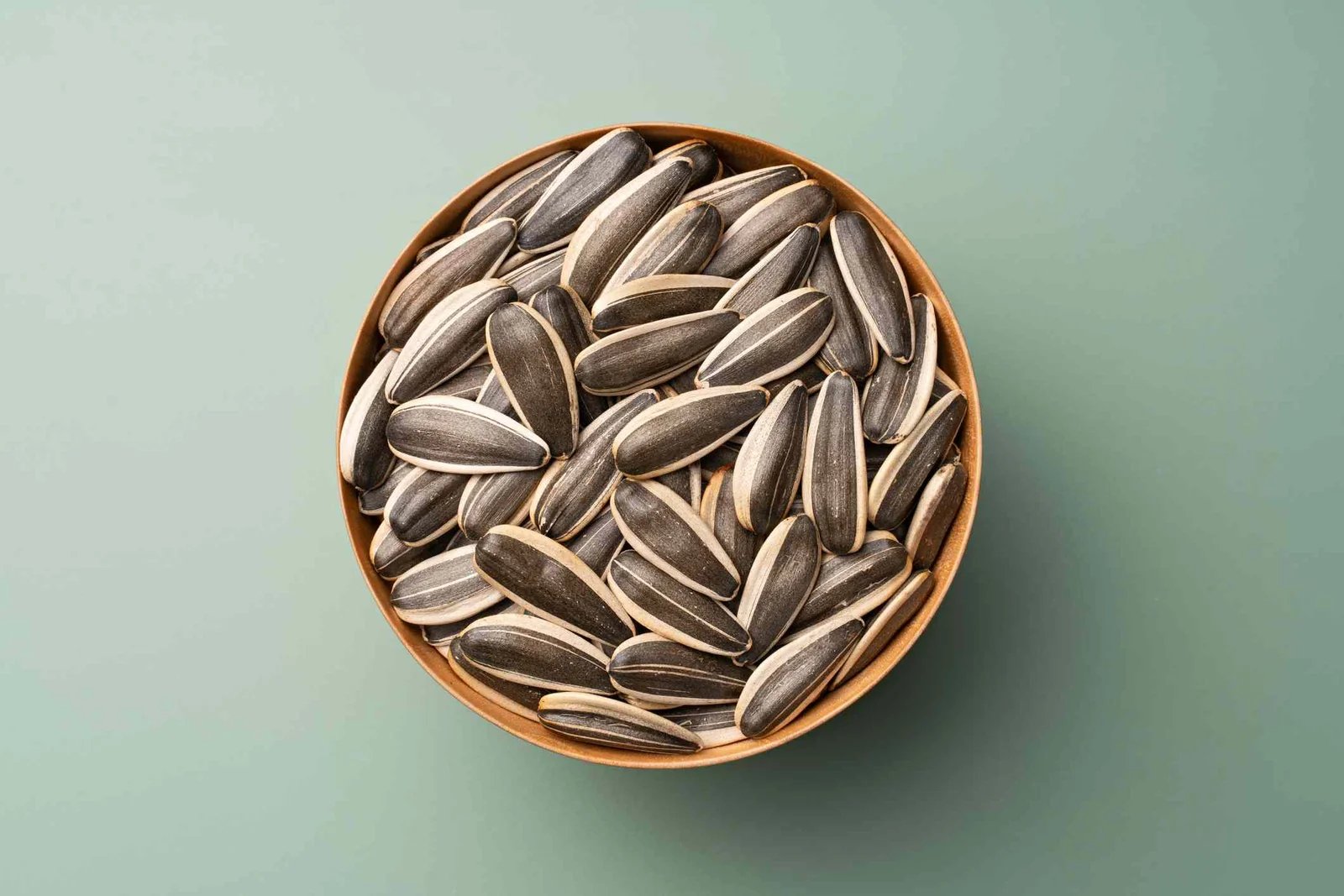
Sunflower seeds are packed with protein, fiber, copper, selenium, zinc, and B vitamins. They are especially known for having a lot of vitamin E. One serving (about 28 grams/1 ounce) has 7.4 milligrams of vitamin E, which is more than 49% of the Daily Value.
Vitamin E helps protect cells from damage caused by things like pollutants, smoking, ultraviolet light, and energy production. It’s also important for heart health and the immune system.
Sunflower seeds are the second-best source of vitamin E per serving, though not the highest. Many other foods, especially oils, contain more vitamin E per gram than sunflower seeds.
13-Smile / Getty Images
Wheat germ oil comes from wheat when it is milled. It has more vitamin E in one serving than sunflower seeds.
- Vitamin E content: 20.3 milligrams, or 134% of the Daily Value (DV), per serving of one tablespoon or 14 grams.
- Health benefits: Wheat germ oil may improve blood lipid levels, but the evidence is limited. Be cautious with wheat germ oil if you have gluten intolerance or celiac disease.
- How to use it: Add wheat germ oil to salads, smoothies, yogurt, oatmeal, or cooked vegetables. High heat can destroy vitamin E. Thus, it’s best to pour it on food after cooking.
Sunflower seeds contain 26.1 mg of vitamin E per 100 g. Here are some foods that provide even more vitamin E per gram.
rezkrr / Getty Images
- Vitamin E content: 47.2 milligrams of vitamin E per 100 grams of hazelnut oil. One tablespoon (14 grams) provides 6.4 milligrams of vitamin E, over 42% of the DV.
- Health benefits: Hazelnuts may support the body’s antioxidant system. A study found that people who eat 40 grams of hazelnuts every day for six weeks had more active genes that help protect cells from damage. No study shows the same benefits for hazelnut oil yet.
- How to use it: Add hazelnut oil to baked goods, sauces, and smoothies, or pour it over roasted vegetables and meats. It gives a rich, nutty taste. Use it for low-heat cooking because it is sensitive to heat. High heat or long cooking can destroy its healthy compounds.
Adela Stefan / Getty Images
- Vitamin E content: 41.1 milligrams of vitamin E per 100 grams of sunflower oil. One tablespoon (14 grams) provides 5.5 milligrams of vitamin E, over 36% of the DV.
- Health benefits: High-oleic sunflower oils are very rich in monounsaturated fatty acids (MUFAs), making up more than 83% of their total fat content. Replacing saturated fats—mainly found in processed and animal foods—with unsaturated fats from plant foods has been linked to a lower risk for heart disease and diabetes.
- How to use it: Sunflower oil, especially high-oleic types, has a high smoke point. This means it is good for frying. You can also use it for sautéing, roasting, or in salad dressings.
- Vitamin E content: 39.2 milligrams of vitamin E per 100 grams of almond oil. One tablespoon (14 grams) provides 5.3 milligrams of vitamin E, over 35% of the DV.
- Health benefits: Almond oil is made up of about 70% monounsaturated fatty acids (MUFAs). Some studies suggest drinking almond oil may improve blood lipid levels. Also, drinking 18 milliliters of almond oil every other day for two weeks helped people over 60 have less constipation and more regular bowel movements.
- How to use it: Use virgin almond oil for low-heat cooking. You can also add it to dressings, sauces, smoothies, and baked goods for a nutty taste. You can also use refined olive oil for sautéing because it can handle heat better.
olgakr / Getty Images
- Vitamin E content: 35.3 milligrams of vitamin E per 100 grams of cottonseed oil. One tablespoon (14 grams) provides 4.8 milligrams of vitamin E, 32 % of the DV.
- Health benefits: Some studies suggest that cottonseed oil may improve blood lipid levels.
- How to use it: Cottonseed oil has a high smoke point and a neutral taste. You can use it for high-heat cooking, frying, or in dressings and sauces.
Wheat germ oil has the most vitamin E per serving, followed by sunflower seeds. Some oils, like hazelnut, sunflower, almond, and cottonseed oil, have more vitamin E in each gram than sunflower seeds.
You can also get a good amount of vitamin E from nuts, seeds, avocado, turnip greens, and salmon.
Disclaimer: This news article has been republished exactly as it appeared on its original source, without any modification.
We do not take any responsibility for its content, which remains solely the responsibility of the original publisher.
Disclaimer: This news article has been republished exactly as it appeared on its original source, without any modification.
We do not take any responsibility for its content, which remains solely the responsibility of the original publisher.
Author: uaetodaynews
Published on: 2025-10-15 16:49:00
Source: uaetodaynews.com
